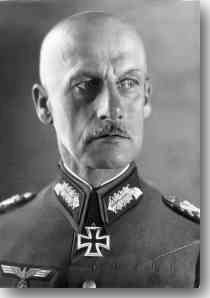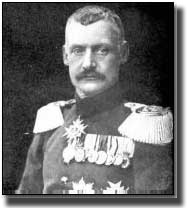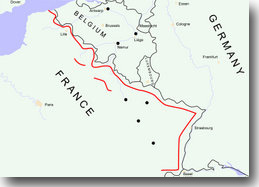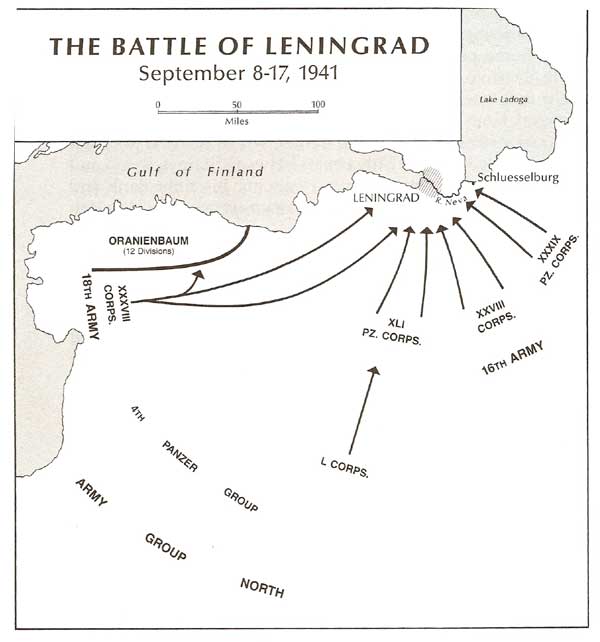|
Field Marshal Ritter Wilhelm Joseph Franz von Leeb. ( 1876 - 1956 )
On the 5th. of September 1876, Wilhelm Franz von Leeb was born at Landsberg-am-Lech in Bavaria. His family had long ties with the Army, so as expected, he was to join the Imperial Army as a Fahnenjunker in 1895, his regiment, the Bavarian 4th. Field Artillery. In a continuance of the family serving in the army, his brother Emil was a general with the artillery and the Commander of IX corps for the campaign in Poland, and Wilhelm's son Alfred was unfortunately killed in Poland. Lieutenant and service in China. By 1911 the potential Field Marshal was made a Captain in 1911, had a spell as a battery commander in Bavaria, and when WW1 broke out he was part of the General Staff of the I Bavarian Army Corps in Munich.
WW1. In 1916 Wilhelm was promoted to Major and was in action against the Russians at Kovel, and he was involved with the subjugation of Roumania. Back he went to the Western Front in 1917, staying there till the war ended. Post WW 1. He reached Major General rank in 1929, and Lieutenant General in 1930 to become the Commander of Wehrkreis VII, he had positively raced up the rungs of the Army promotional ladder, only 5 years to advance from Lieutenant Colnel to Lieutenant General, a huge and fast climb. One might ponder on the jealousy factor amongst his contemporaries, but it would appear he was held in high regard, and considered an authority on the subject of defensive warfare, and had published a number of articles on the subject. Leeb's book Defense, published in 1938. Leeb a practicing Catholic. Prior to 1942, Army promotion did not hinge on an officer being a rabid Nazi, so in 1934, Leeb was made a General of Artillery and named Commander of Army Group 2 at Kassel, at that time there were but two Army Groups in Germany, it was later that they increased to a total of six. By 1937 Army Group 2 controlled some eleven infantry divisions and four frontier commands. Leeb gets retired. General Wilhelm von Leeb headed the list to go, and he was retired as an honorary Colonel General on the 1st. of March 1938, replaced by General List. His retirement was short lived, called back into service the following August, and given command of the new 12th. Army as it seemed Hitler's expansion policy might well need to use force. In the event, he achieved the dismemberment of Czechoslovakia without a fight. Leeb's troops in southern Bohemia were sent back to Bavaria, and once more he went into retirement. Recalled once more. He did not have a single panzer on the whole of the Western Front. On paper he was facing 106 French divisions, elements of the French 3rd. and 4th, armies attacked in the Saar area on the 9th. of September, and Leeb was forced to fall back to defensive positions based on the Siegfried Line. By the 13th, the French had advanced five miles stretched along a sixteen mile front, but they halted, never to advance again. The Polish Army was in tatters by the 20th. of September, and Leeb was getting large reinforcements from the Polish front, the Dutch and Belgians flooded their land in a defensive mode, and the Allies had missed the bus to push into the heart of Germany, they now would have to wait until 1944. Leeb regains lost territory. Loss of his son in Poland. Back on the Western Front.
Field Marshal status.
Russia beckons. The task given to von Leeb was a tough one, he had the smallest forces amongst the three German Army Groups, a total of 26 divisions facing some 30 Russian divisions. whilst another 20 Russian divisions lurked around Leningrad. Leeb was not trained to look after large panzer formations, and was somewhat out of his depth in this area, but his Tank Commander Hoepner was a capable operator, although he did not always see eye to eye with his superior. Attack. Complete suprise was achieved, and by next morning the 291st. Infantry Division had advanced 40 miles, they were through Lithuania into Latvia. Hoepner split his panzer forces, sending Manstein towards the Dvinsk River bridge, and left General Georg-Hanseinhardt's XLI panzers to cope with the Soviet III and XII Tank Corps. But trouble loomed, when Reinhardt took on 300 Russian tanks near Rossizny, the enemy tanks superior to the German, and the German anti tank gunners were amazed to observe their shells just bouncing off the advancing Russian tanks. The Russians did not attempt encirclement, but attacked frontally, and Leeb's artillery was able to halt this assault. The German forces counterattacked, and by the 28th. of June, some 400 Soviet tanks, armoured vehicles, and 200 guns had been captured or destroyed, and 6,000 prisoners taken. The Russians were in total retreat, but had not been destroyed, just that battle lost. Meanwhile Manstein's tanks were across the Dvinsk river to face a Soviet counterattack which was repulsed. He wanted to press on, but Hitler called a halt as Manstein's forces were 60 miles in front of the nearest German troops. He was forced to mark time for a week, allowing the Soviets to organize their resistence along the Stalin Line, at the old Russian-Estonian border. Hoepner and Leeb differ. Now the Army C-in-C met with Hoepner and Leeb at the latter's HQ on the 7th. of July and Brauchitsch gave his approval to Hoepner's proposal to advance on Leningrad via the Pskov-Luga- Leningrad road with Reinhardt's XLI panzer group, whilst Manstein advanced via Novgorod and onwards to Leningrad, really the only two possible routes to their objective. Given these two arms of attack were the only way to go, suprise was out of the question, and both these prongs were a 100 miles apart. On the 10th. the advance got under way, but Reinhardt was faced with both tough terrain, and formidible Soviet resistance, being stopped after but two days. To the south, on the 14th. of July 1941, Manstein was attacked by the reinforced Russian 11th. Army, to be cut off at one stage from the remainder of Army Group North, Hoepner boldly took a risk, he moved Manstein's total Corps northwards with the objective of turning the flank of the Soviets that were in the path of Reinhardt's troops. His enterprise paid off, and in a few more days Hoepner's panzers were on their way again, now only 80 miles short of Leningrad. But both Hitler and his high command now got cold feet, and ordered Hoepner to halt Manstein's Corps until the foot sloggers from the 16th. Army could catch up and secure his right flank, but this took three weeks to achieve, the advantage lost, and giving the Russians the benefit of time to rally and get their defences prepared. Any initiative now lost, Hitler decreed that the 18th. Army would clean up and secure the Baltic campaign before Leeb could move on to take Leningrad. Leeb's advance rate had slowed from seventeen miles a day prior to the 10th. of July had now petered out to just a mile a day over August. He was ill using his armour, such as committing his tanks to clearing his communication lines, a task they were unsuited for, it tied up the 8th. Panzer for more than a month. But on the 8th. of August, Hoepner was again on the road to Leningrad, Reinhardt on his left, and Manstein on his right. The country terrain unsuitable for the operation of armour, swampy and forest, added to which the Soviets had used their breather to good effect, and resistance was well prepared and strong. By the 14th. the swamps were left behind , but now Leeb was forced to take half of Hoepner's armour away to plug a problem with Hansen's X Corps, threatened by the Soviet 34th. Army pinning them against the southern shore of Lake Ilmen. Manstein after a rush over 100 miles threw two Divisions into the 34th's rear to trap them between his forces and X Corps. By the 24th, this Russian Army was no more, but three more Russian Armies were thrown into the attack between Lakes Peipus and Ilmen, isolating both LVI panzers and the 16th. Army. Further disagreement between Leeb and Hoepner. Three valuable weeks for the Russians to build up their defence of Leningrad, and Hoepner, starved of needed infantry was forced on the defensive. The Chief of Staff of 4th. Panzer Group later stated, Leeb took this course so that his very personal friend General von Kuechler might take a prominent part in the capture of Leningrad. If true, a serious charge, no Field Marshal or General in the field should ever allow personal bias to cloud his decisions to the detriment of the campaign in hand. Estonia cleared. Leeb ready to now move on Leningrad. This city formerly St. Petersburg, in 1941, was the number two city in Russia, and boasted a population of some 3 Million. It was the home port of the Russian Batlic Fleet, had munition plants, tanks were built here, ship yards, and textile mills, in fact it was of immense importance to the total Soviet war effort. The Russians were not about to surrender Leningrad lightly. In the first week of September, Army Group Centre loaned Leeb, General Hoth's 3rd. Panzer Group which was used to defeat the Soviet 2nd. 27th. and 34th. Armies between Staraya Russa and Kholm. Leeb had a half circle of his forces, fanned out in front of Leningrad, on the left the XXXVIII Corps of the 18th. Army, the centre where the main push was made by XLI Corps, and on the right wing XXVIII Corps, and at the exteme eastern end the Panzer Corps XXXIX moved towards Schluesselberg on the south end of Lake Ladoga, their objective to cut off the city.
Over three days Reinhardt's troops inched their way forward, until at 11.30 AM on the 11th. of September, Hill 167, known as the Generals Hill of the Czars was taken. From this vantage point, both Leningrad and the sea were in sight.The 58th. Infantry Division captured a tram in Uritsk, only 6 miles from the Cities centre. Schleusselburg also fell, sealing off the city of Leningrad to the east, the leading tank crews could see in the distance the golden spires of the Admiralty building on the banks of the Neva River. Hitler makes a fatal decision. On the 12th. of September he ordered Leeb not to take the city, but to seal it off, and let the inhabitants be starved into surrender. He was told to release five Panzer and two motorized Divisions, and most of his air support, Leeb protested violently, but it all fell on deaf ears. Surely not to take this major city must be one of the worst strategic decisions in the whole of WW2. Inside Leningrad 30 Russian Divisions were trapped, but they were not destroyed, and with the coming of winter, the rivers and lakes froze, and they built a railway across the ice to Murmansk. The German 18th. Army obviously needed elsewhere had to be tied down, sitting outside Leningrad until January of 1944. In January 1943, something over 22 German Divisions were needed to maintain the siege. The city was never conquered, and after 28 long and frustrating months, the siege was broken. Bauxite area in Russia. In mid October XXXIX Panzer Group started their advance on Tikhvin, by the 8th. of November Tikhvin had fallen, now Stalin counterattacked, and on the 15th. of November von Arnim was forced to retreat, the XXXIX Panzer Group were spread over a 230 mile line to Tikhvin, and were under severe attack by Soviet armies. Leeb was anxious about his long front, and Hitler told him that Bock's move on Moscow would ease the pressure on his spread out troops, but not so, that did not happen. On the 8th. of December Leeb finally convinced Hitler to allow him to retreat, and by the 21st. of the month, the Panzers had made the dreadful journey back to Volkhov. They had to cope with temperatures as low as minus 61 degrees Fahrenheit, the 18th. Motorised Division was decimated, losing 9,000 men, reduced to but 741. How to make yourself unpopular with Hitler. In mid November Leeb wanted to go into winter quarters, further upsetting Hitler, and then on the 14th. of December he wanted to pull back beyond the Volkhov River, but was refused as it would lessen the grip on Leningrad. Both Bock and Rundstedt, commanders in the Russian Campaign had been sacked but Leeb seemed to be safe in that regard, it was rather his own build up of frustration that was leading to his dismissal. Russian Troops launch massive offensive. By the 17th. of the month the Soviet 2nd. Strike Army had smashed through the German 16th. Army on a front of 20 miles between Chudovo and Novgorod, the Volkhov River was crossed. The striken Army Group had thousands of casualties from frost bite, many victims had double amputations, and wounded were freezing to death from lack of blankets. Leeb threw in his final reserves but the Soviet machine rolled on, it was imperative for Leeb to pull II Corps back and to stage a general retreat to the Lovat River so he might restore his line, but Hitler snug in Berlin refused, and II Corps with 100,000 men were encircled. The last straw for Field Marshal von Leeb. He now retired to Bavaria never to be employed in the Army again. Allies arrest von Leeb at the end of WW2. After release from prison he retired in the town of Hohenschwangau in Bavaria to die aged 79 on the 29th. of April 1956.
Conclusion. He did well in France, and was awarded with being promoted to Field Marshal, he would certainly have captured Leningrad had Hitler not interfered. Unlike some of his contempories there was not a breath of scandal uttered about him. He appeared to be a dedicated soldier whose talents as a defensive expert were not used when they were most needed. Sometimes in Russia he may have tarried when attack was the needed decision. von Leeb comes across as a decent Officer and gentleman, who probably did not deserve a three year prison sentence. See the Index to "Adolf Hitler and his WW2 Field Marshals" |

 Note: Ritter is the lowest-ranking title of lower nobility, in German-speaking areas, considered equal to the title Knight.
Note: Ritter is the lowest-ranking title of lower nobility, in German-speaking areas, considered equal to the title Knight.



